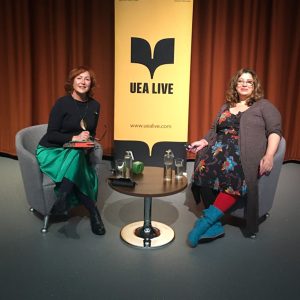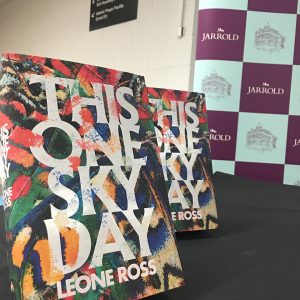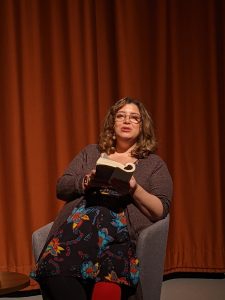Food, Fun, Female Pleasure – Leone Ross at UEA Live
Written for UEA Live by Ersi Zevgoli

Alison Donnell and Leone Ross at UEA Live
Leone Ross’ new book, This One Sky Day, has been fifteen ‘bloody’ years in the making, as the author herself said when she sat in UEA’s Lecture Theatre with Alison Donnell. Ross’ fun, humorous personality became apparent almost before Professor Donnell had even finished her introduction of the author, this week’s UEA Live guest promptly interrupted her host in order to tease her. The audience was ready to laugh along to Ross’ jokes; the chuckles were frequent and reverberated across the room.
This One Sky Day, Ross’ third published novel, is a ‘labour of love,’ as Professor Donnell called it. It can only be that – fifteen years in the making, Ross must have had unquenched patience and perseverance to keep going back to it, reworking and perfecting. The book covers a single day on the fictional island of Popisho in the Caribbean, where every inhabitant has a unique magical ability, spanning from the mundane, to the extraordinary. The narrative follows Xavier, a chef that battles with addiction, and Anise, a healer who has not yet dealt with her own trauma and loss. In this magic realism novel, which is shortlisted for the 2021 Goldsmiths Prize, anything goes. Vulvas drop out of women’s bodies and are put back into place (or not), moths can be made into hallucinogenic drugs, and one very special person walks through life with no flatulence whatsoever.
Not a moment went by during the event where Ross’ sheer joy and mischief in writing this book wasn’t apparent. She admits to feeling guilty at first for not researching the book enough, of ‘spending more time in kitchens than [she] did in libraries’ in order to better understand her protagonist’s work life. She tried confining herself to the writer she thought she ought to be as a Black British-Jamaican woman. But a moment of realisation came to her, and made her change her approach; ‘Where’s the fun? Where’s the joy?’ So she abandoned the musts and the shoulds, and followed the mischief and the fun. Perhaps one of the most revolutionary thoughts about writing I have heard during my three-year Creative Writing degree.
Not that politics and race are absent from the novel, how could they be? ‘Magic Realism is a literature of indigenous people,’ Ross pointed out. In freeing herself from expectations of what sort of a writer she should be, Ross came back to politics and race in her own way. Professor Donnell, whose specialty lies in Post-Colonial Caribbean literature, said that Ross offers a different genesis that is not flavored by the ‘Post-Colonial Malaise.’ Popisho is never colonised itself, but Ross offers ‘just a little smell of colonialism.’ Its repercussions reach Popisho’s shores with 203 emancipated slaves, who admittedly try to colonise the island, but the emancipated and local populations reached a truce as they took shelter during a severe storm. Ross wanted to go down this road just to see what would happen ‘for the fun of it.’ This is how she has written most of the book, and the hilarity of it is evident, even from the meager three passages that were read aloud. The author admitted that this book could not be set anywhere else but the Caribbean, where she has lived for many years – she speaks several dialects of Patois and proceeded to create her own for Popisho. She had to write about what she intimately knew in order to explore the more fantastical elements of the story, focus on the world building, and give flesh and heart to her creation.
is a literature of indigenous people,’ Ross pointed out. In freeing herself from expectations of what sort of a writer she should be, Ross came back to politics and race in her own way. Professor Donnell, whose specialty lies in Post-Colonial Caribbean literature, said that Ross offers a different genesis that is not flavored by the ‘Post-Colonial Malaise.’ Popisho is never colonised itself, but Ross offers ‘just a little smell of colonialism.’ Its repercussions reach Popisho’s shores with 203 emancipated slaves, who admittedly try to colonise the island, but the emancipated and local populations reached a truce as they took shelter during a severe storm. Ross wanted to go down this road just to see what would happen ‘for the fun of it.’ This is how she has written most of the book, and the hilarity of it is evident, even from the meager three passages that were read aloud. The author admitted that this book could not be set anywhere else but the Caribbean, where she has lived for many years – she speaks several dialects of Patois and proceeded to create her own for Popisho. She had to write about what she intimately knew in order to explore the more fantastical elements of the story, focus on the world building, and give flesh and heart to her creation.
World building and Post-Colonial discourse are not the only things this book has to offer, ‘it’s a very sexy book’ Professor Donnell underlined. Ross was delightfully and refreshingly nonchalant about it. She admitted to not realising just how many sex scenes she has included in the novel until her editor pointed it out. Her approach to writing these is the same as writing any other scene, so the more steamy parts of the book escaped her notice. This natural, uncomplicated approach to the subject of sexuality that permeates Ross’ work is unique, it normalises and celebrates sexual desire, in particular female sexual desire. Ross has revisited the question of female sexuality and pleasure before, and the short stories Drag and Art, for Fuck’s Sake from her short story collection Come Let Us Sing Anyway came to mind. The incident of the escaping vulvas, and more importantly the reaction that each woman on the island has to this, also sparks thought and conversation about sexuality. It makes the reader think: what would I do if my vulva dropped as I was walking on the street? How would I react? Each woman will have a different response, and that response will be revealing about their sexuality and how they perceive it.
This sexuality is also apparent in the prose of the novel; the language used to describe food and flavor has a sensual element to it. The correlation between food and sexual pleasure is strong – both are integral to a good life, and are not solely functions of preservation. Xavier’s creations made Professor Donnell’s mouth water, and want to taste butterflies, a delicacy on Popisho. But this element of the novel is not as simple as it might at first seem. ‘I have a really complicated relationship with food,’ said Ross. This is her way of letting that go, of fully embracing and enjoying the pleasure that both sex and food can provide. Women in particular have always been shamed for enjoying either, and seeing this issue that plagues me too addressed with such honesty was like a big, strong hug after yet another lockdown. It gave me hope that perhaps I will be able to write about this as well at some point. Maybe, just maybe, I’ll make my own peace, and learn to enjoy both shamelessly.

Leone Ross at UEA Live
The evening, even as it was joyous, and funny, and honest, definitely made me think a little deeper and a little clearer about myself, both as a woman and as a writer. Ross’ ease at talking about issues closer to her and laying out before the audience personal matters and her work process for this novel was soothing and warming – much needed on the rainy November evening. It is easy for us Creative Writing students in particular, who aspire to write and publish our own novels and short story collections, to assume that, because someone is a successful writer, their writing comes easy to them, flowing like a mountain spring of water. But assumptions and categorizations never serve anyone, as Ross showed us. Xavier admits it to himself in the novel: ‘there is no pain like assumption.’
Ersi Zevgoli is a third-year Creative Writing student who is still figuring out how to be Greek in the UK. She runs mostly on words, black coffee, and late-night confessional chats that end in tight hugs. You can find her blowing off steam in the gym, laughing too loudly at the pub, or slaying monsters with her mates at her regular Sunday Dungeons and Dragons session.

